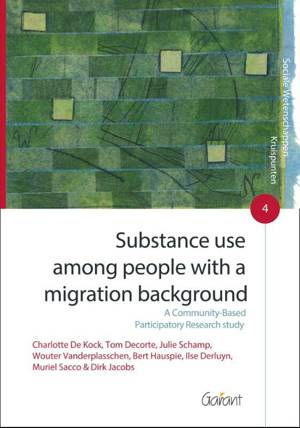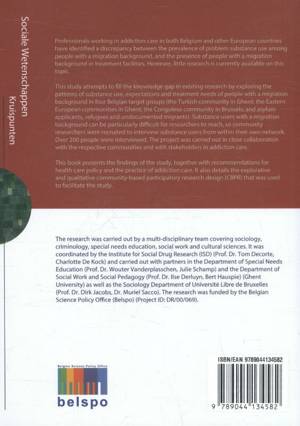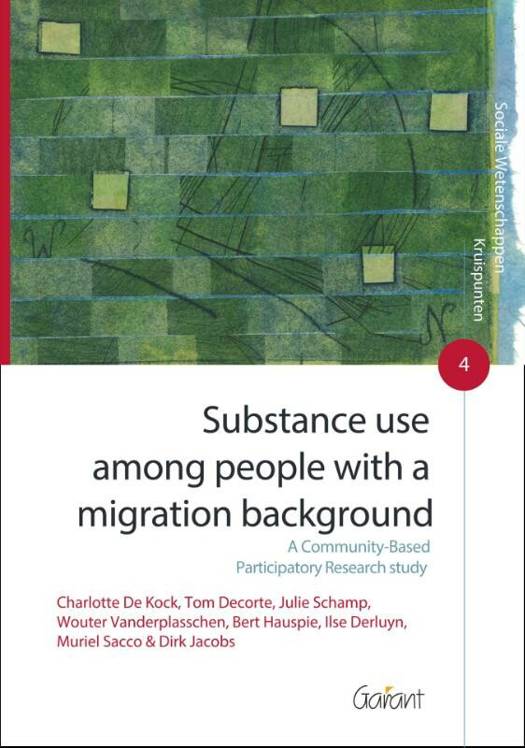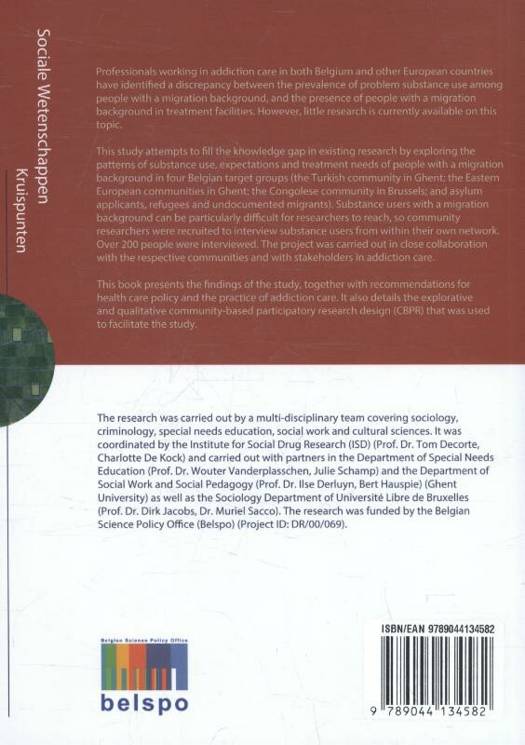
- Afhalen na 1 uur in een winkel met voorraad
- Gratis thuislevering in België vanaf € 30
- Ruim aanbod met 7 miljoen producten
- Afhalen na 1 uur in een winkel met voorraad
- Gratis thuislevering in België vanaf € 30
- Ruim aanbod met 7 miljoen producten
Zoeken


Substance use among people with a migration background. A Community-Based Participatory Research (CBPR) Project
A Community-Based Participatory Research (CBPR) Project
De Cock Charlotte
€ 36,90
+ 73 punten
Omschrijving
Professionals working in addiction care in both Belgium and other European countries
have identi?ed a discrepancy between the prevalence of problem substance use among
people with a migration background, and the presence of people with a migration
background in treatment facilities. However, little research is currently available on this
topic.
This study attempts to ?ll the knowledge gap in existing research by exploring the
patterns of substance use, expectations and treatment needs of people with a migration
background in four Belgian target groups (the Turkish community in Ghent; the Eastern
European communities in Ghent; the Congolese community in Brussels; and asylum
applicants, refugees and undocumented migrants). Substance users with a migration
background can be particularly di?cult for researchers to reach, so community
researchers were recruited to interview substance users from within their own network.
Over 200 people were interviewed. The project was carried out in close collaboration
with the respective communities and with stakeholders in addiction care.
This book presents the ?ndings of the study, together with recommendations for
health care policy and the practice of addiction care. It also details the explorative
and qualitative community-based participatory research design (CBPR) that was used
to facilitate the study.
The research was carried out by a multi-disciplinary team covering sociology,
criminology, special needs education, social work and cultural sciences. It was
coordinated by the Institute for Social Drug Research (ISD) (Prof. Dr. Tom Decorte,
Charlotte De Kock) and carried out with partners in the Department of Special Needs
Education (Prof. Dr. Wouter Vanderplasschen, Julie Schamp) and the Department of
Social Work and Social Pedagogy (Prof. Dr. Ilse Derluyn, Bert Hauspie) (Ghent
University) as well as the Sociology Department of Université Libre de Bruxelles
(Prof. Dr. Dirk Jacobs, Dr. Muriel Sacco). The research was funded by the Belgian
Science Policy O?ce (Belspo) (Project ID: DR/00/069).
have identi?ed a discrepancy between the prevalence of problem substance use among
people with a migration background, and the presence of people with a migration
background in treatment facilities. However, little research is currently available on this
topic.
This study attempts to ?ll the knowledge gap in existing research by exploring the
patterns of substance use, expectations and treatment needs of people with a migration
background in four Belgian target groups (the Turkish community in Ghent; the Eastern
European communities in Ghent; the Congolese community in Brussels; and asylum
applicants, refugees and undocumented migrants). Substance users with a migration
background can be particularly di?cult for researchers to reach, so community
researchers were recruited to interview substance users from within their own network.
Over 200 people were interviewed. The project was carried out in close collaboration
with the respective communities and with stakeholders in addiction care.
This book presents the ?ndings of the study, together with recommendations for
health care policy and the practice of addiction care. It also details the explorative
and qualitative community-based participatory research design (CBPR) that was used
to facilitate the study.
The research was carried out by a multi-disciplinary team covering sociology,
criminology, special needs education, social work and cultural sciences. It was
coordinated by the Institute for Social Drug Research (ISD) (Prof. Dr. Tom Decorte,
Charlotte De Kock) and carried out with partners in the Department of Special Needs
Education (Prof. Dr. Wouter Vanderplasschen, Julie Schamp) and the Department of
Social Work and Social Pedagogy (Prof. Dr. Ilse Derluyn, Bert Hauspie) (Ghent
University) as well as the Sociology Department of Université Libre de Bruxelles
(Prof. Dr. Dirk Jacobs, Dr. Muriel Sacco). The research was funded by the Belgian
Science Policy O?ce (Belspo) (Project ID: DR/00/069).
Specificaties
Betrokkenen
- Auteur(s):
- Uitgeverij:
Inhoud
- Aantal bladzijden:
- 322
- Taal:
- Engels
- Reeks:
- Reeksnummer:
- nr. 4
Eigenschappen
- Productcode (EAN):
- 9789044134582
- Verschijningsdatum:
- 21/10/2016
- Uitvoering:
- Boek
- Afmetingen:
- 240

Alleen bij Standaard Boekhandel
+ 73 punten op je klantenkaart van Standaard Boekhandel
Beoordelingen
We publiceren alleen reviews die voldoen aan de voorwaarden voor reviews. Bekijk onze voorwaarden voor reviews.








